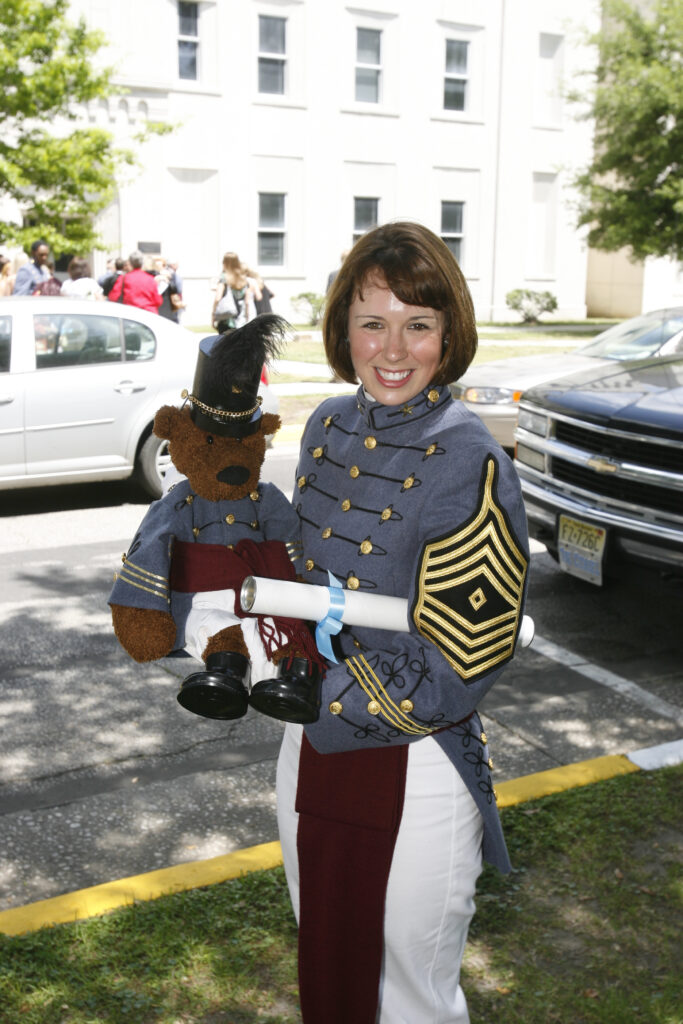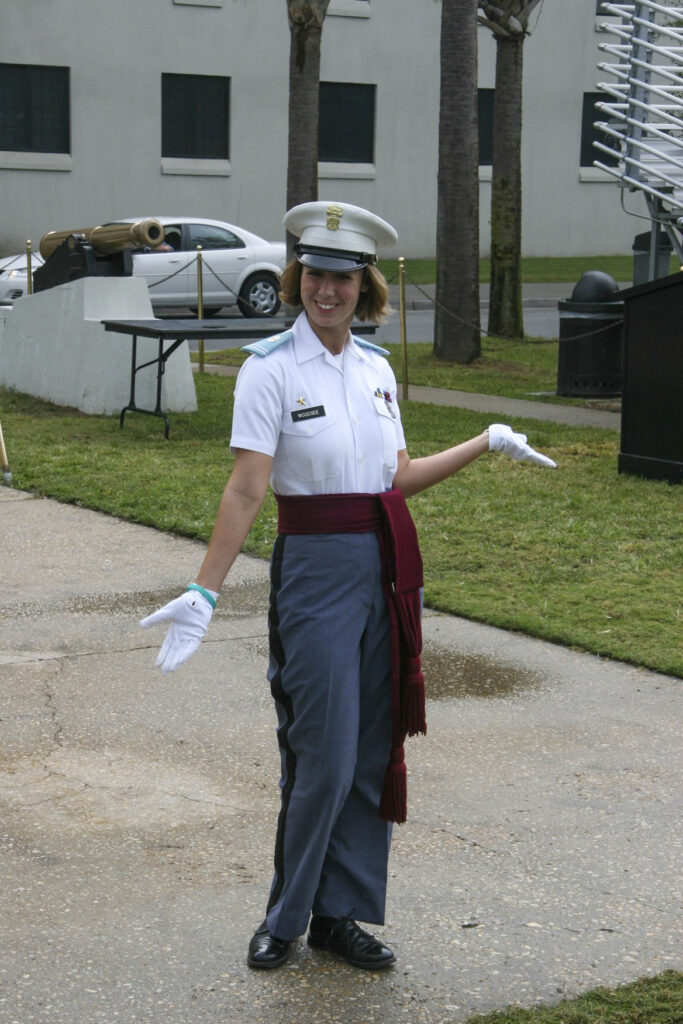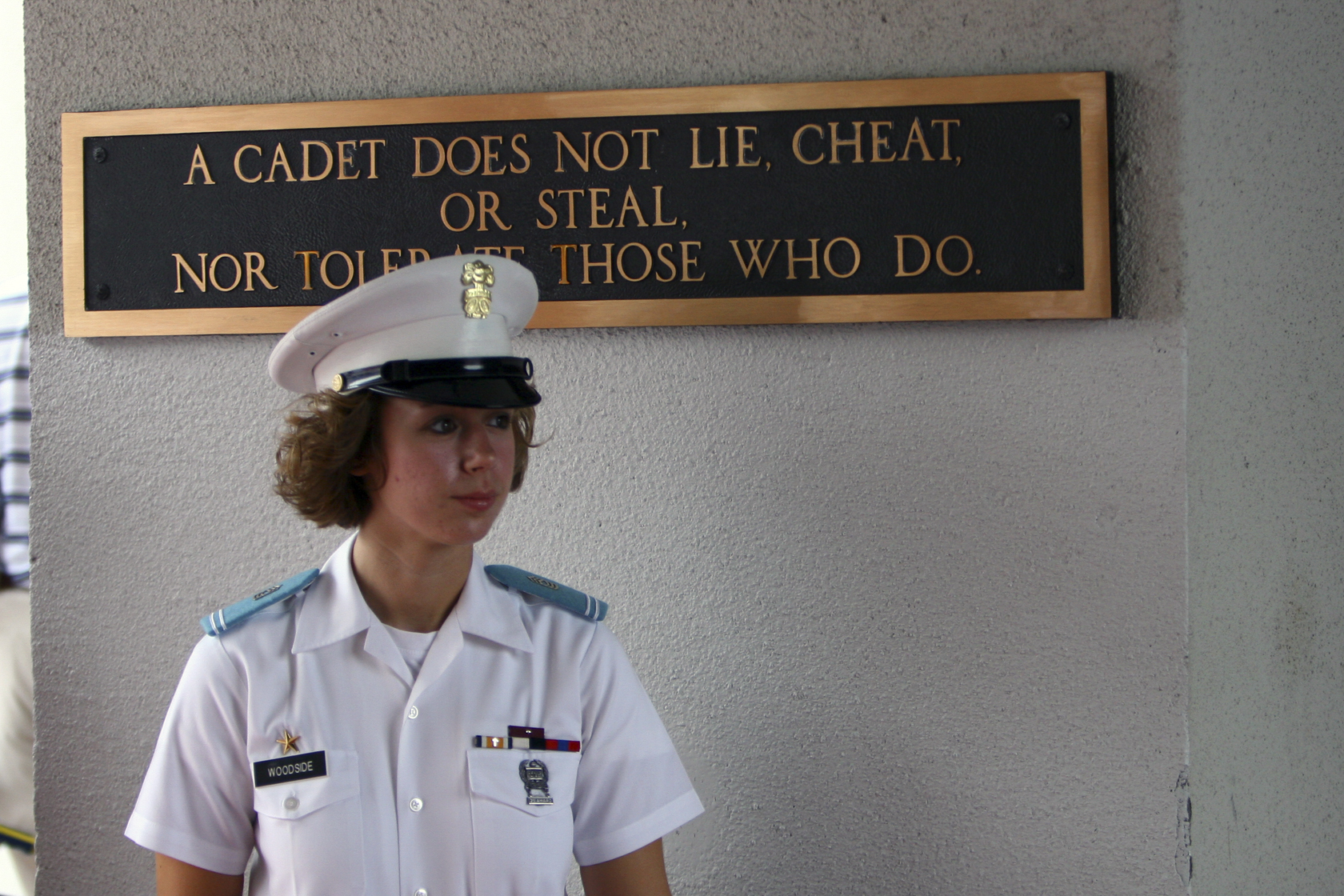2005
Originally published in The Citadel, 2005
The Citadel is not a frivolous place; it is a world of uniforms, marching and challenge where students go not for an adventure but for an intense academic program after which they know they will graduate prepared to become leaders. It is a world where freshman cadets are referred to as knobs because their closely shorn heads resemble door knobs, where knobs walk 120 paces per minute and where they undergo a rigorous system of training called the fourth class system. And when a wide-eyed young woman from Salem, N.J., leaves behind the comforts of home to begin her first year, she is certain to grapple with her feelings for the institution she admires.
When I reported to The Citadel in August 2004, I promised myself that the college would not change me. After all, it was just a college. Like so many outsiders, I had been dazzled by the pomp and circumstance of the dress parades, with the bagpipes’ serenade and the senior officers with their shiny swords and big-feathered hats that they called shakos. The grass was so green, the buildings were so white and everything seemed so perfect. Still, I did not understand the fierce loyalty cadets and alumni swore, not only to one another, but to their alma mater. No, I assured myself, this place would never change me. It just did not make sense that a single college could change a person.
I repeated my vow as knob year began. There were days, many of them, when I wondered why I had bothered to report. Matriculation day, Aug. 17, was the worst day of my life. It seemed like I had talked about going to The Citadel forever. I had sent my application in more than a year before. My parents and I had made several trips to the campus, including visits for an Honors Program interview and the pre-knob overnights where I, as a prospective academically accepted student, spent 24 hours with a knob. On each visit, my family and I strolled across the perfectly manicured parade field located at the heart of the campus and admired the jet, cannons and tanks on display. We visited the gift shop, and I bought a t-shirt. Why then, I wondered, was this day so different from the others? Then it hit me. This was the culmination of all those preceding days. This was the day I walked across the red-and-white-checkered quad all by myself and accepted the challenge to earn the right to be called a Citadel cadet.
Even as I write this article as a rising sophomore, pangs of the emotions I felt that day and in the days, weeks and months following still haunt me. Never before had I felt so alone and hopeless. Each day I had yet another encounter with the unfamiliar. To start with, there was my room. The dimly lit shoebox where I piled my belongings the first day felt cold and barren with its gray walls, hardwood floor, and metal door and furniture. It was a stark contrast to my bedroom back home with the Mickey Mouse theme, friendly, bright white walls, red down comforter and rich cherry furniture.
Early in the academic year, my best friend e-mailed me from college and went to great lengths to describe how she and her roommate had bought matching bedspreads and posters to hang on the walls in their dorm room. I looked over at the bunk beds we referred to as racks. Not only did my roommate and I have matching bedspreads, but so did the entire Corps of Cadets. Then I looked up at my naked, gray walls. Even if I had wanted to hang a poster or two, I was not allowed. If these simple facts did not make me homesick enough, the last line of her e-mail was the clincher. She wrote about how much she loved college, her roommate, and how happy and excited she was to finally be on her own… I started crying.
It was difficult to love a college where you do cycles of running, sit-ups, pushups, crunches, flutter kicks and relays two times a week for an hour; where you sit up straight on the first three inches of your chair at every meal; where at meals you are required to pop off a fact about the history of the college and know the menu three meals in advance; where you wear a gray uniform all day, every day; where you are required to walk 120 paces per minute and where on the Avenue of Remembrance you walk those 120 paces in the gutter; where you salute and say, “Sir, good afternoon, sir!” to passing senior officers; where you are only permitted to have one 8×10 picture frame on your desk; where your room must be immaculate every morning; where your uniforms are hung in a specific order; where it is not even convenient to sleep between the sheets and certainly not recommended that you bring your favorite teddy bear.


If adjusting to these lifestyle changes, as insignificant as some of them seemed, was not challenging enough, what little vanity we each carried around inside of us came under attack. From the moment I reported, I knew it was only a matter of time before I entered the barber shop to receive the infamous haircut that distinctly denotes a member of the fourth-class system. When the time arrived, I sat in the barber chair, biting my tongue, clenching my teeth and gripping the handles of the chair so hard the blood left the tips of my fingers and they turned white.
I could hear the snips of the scissors around my ears, and while they left me and the other female cadets with some hair, I watched as they completely sheared off the shaggy black locks of the boy across from me. After that, I did not look in the mirror for two weeks. It is no wonder, then, that the vision I had of pomp and circumstance dissipated in the sweat of sweep details and was drowned in the yelling of cadet corporals and sergeants. The drone of the bagpipes, which had once filled my eyes with tears, now became the norm, and the shiny swords and feathered plumes, which denoted senior cadet officers, were now things I wanted to avoid. Upon closer examination, the grass no longer seemed so green, the buildings were cracked and weathered, and the occasional weed sprouted up in the cracks of the sidewalk and quad. It seemed that nothing was perfect.

Life in the barracks was not perfect either. Returning to the barracks every morning from mandatory formation and breakfast, we retreated to our rooms, grabbed the brooms each one of us had been issued and lined up on the gallery outside of our rooms for sweep detail. The knob closest to the outside of the gallery bordering the quad started first and swept the debris that littered the cement walkway toward the wall. The second knob then began and so on until we reached the end of the gallery with a pile of dust bunnies, cigarettes and candy wrappers. This duty had to be performed quickly and efficiently. If we were not fast enough or missed something along the way, our sergeants yelled at us to go back and sweep again. And as we swept we usually recited knob knowledge, which could include the alma mater, the cadet creed and the company chain of command. By the time the bugle sounded and I walked my 120 paces per minute to class, beads of sweat rolled down my cheeks, and the opportunity to sit in a chair and take notes for 50 minutes came as a welcomed relief.
I found my classes challenging, and, for the most part, captivating and interesting. Beyond anything else, I was both pleased and a bit astounded to discover how approachable and eager to help my professors were. I could jot an e-mail or stop by the professor’s office, and if it was not convenient to go over my questions or concerns then, we would schedule a time when we could. Shortly after first-semester midterms, one of my professors I found my classes challenging, and, for the most part, captivating and interesting. Beyond anything else, I was both pleased and a bit astounded to discover how approachable and eager to help my professors were. I could jot an e-mail or stop by the professor’s office, and if it was not convenient to go over my questions or concerns then, we would schedule a time when we could. Shortly after first-semester midterms, one of my professors asked me why I never asked for help on any of my assignments. I shrugged my shoulders and said I did not think it was necessary because I had an A in the class. Still, he insisted I drop by to have my papers critiqued.
As the months slipped away and the year progressed, I settled into my routine as a knob. While it never became easy, it became tolerable after I accepted that sweep details, morning officers, and parades were simple facts of life. I grew accustomed to my short haircut and started looking in the mirror again. At one point I became proud of it because it was a physical symbol that I was a member of the Class of 2008 and that my classmates and I were going through this year, our knob year, together. I had started knob year, and I was going to finish it.
For nine long months, from August until May, I saw through the eyes of a knob the college I swore would never change me. I could never have been more wrong. On Recognition Day, when the Class of 2008 emerged from the fourth-class system, it was as if the fog had lifted and the clouds had parted. As the bagpipes played and my classmates and I lay tired and exhausted in a dirty, sweaty heap, piled on top of one another on the quad around our company flag, tears streamed down my face as we recited the cadet prayer in unison. In my final moments as a knob, I began to understand the passion and fervent devotion upperclassmen and alumni have for the college, for their college. It is something a tourist, a prospective student and, especially, a knob cannot understand. Although my fascination for the pomp and circumstance had not returned, something much deeper and stronger had taken its place. I finally understood that it was not about how loud the bagpipes played, or how shiny the swords were, or how large the plumes on the officers’ hats were. It was not even about how green the grass was or how white the buildings were. None of these things, so impressive to the outsider, is what inspires the bond between the cadets and their college. Everything we did during that year, from mess facts to sweep details and all that was in between, was designed to break us down as individuals only to later rebuild us as a team, wholly and utterly dependent upon one another. In reality, I was correct when I said that a college could not change a person. The Citadel, buildings composed of mortar and bricks, did not change me. The fervent devotion cadets and alumni have is not inspired by mortar and bricks. It is instead the final masterpiece of the unity, dependence and common thread of experience forged beginning with knob year that binds them to one another and to The Citadel—their Citadel.
A registered nurse, Woodside completed her doctorate degree in nursing and currently serves as patient safety manager for a large tertiary health system in the Northeast, where she has contributed to the development of evidence-based patient safety programs in the long-term care and ambulatory settings. Nominated as a Delaware Today Top Nurse in Quality, Safety and Risk Management, Woodside uses her public relations and healthcare administration background to focus on special areas of interest in healthcare including increasing internal event reporting, decreasing patient appointment no-show rates in primary care, decreasing patient falls and the ethics of policy on geriatric patients’ sexual rights.

